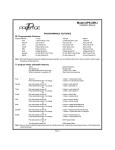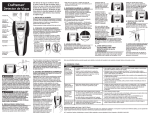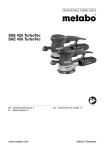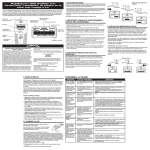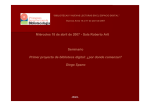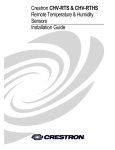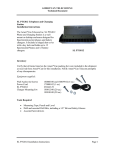Transcript
StudSensor™ Pro LCD Stud Finder with AC WireWarning® and SpotLite ® Pointing System 1. INSTALLING THE BATTERY NOTE: DO NOT LOOSEN OR REMOVE SCREW ON BACK OF THE UNIT. Without moving unit, squeeze and hold On/Off button. Wait for the beeping to stop and for the TruCal® icon to turn on. Mark this second spot. Middle of stud is centered between the two marks. WORKING WITH DIFFERENT MATERIALS StudSensor™ Pro LCD is for use on dry, interior walls only. Note: Sensing depth and accuracy can vary due to moisture content of materials, wall texture, and paint. StudSensor™ Pro LCD can scan effectively through most sheet materials, including: • Bare wood flooring (in DeepScan mode) • Linoleum on wood base • Gypsum drywall over plywood sheathing • Wallpapered walls (if dry) • Textured ceilings if uniform thickness (Place a thin piece of cardboard on ceiling and scan through it to avoid damage to texturing.) StudSensor™ Pro LCD is not designed to scan materials with inconsistent density such as: • Ceramic floor tile • Carpeting and padding • Wallpaper with metallic fibers • Freshly painted walls that are still damp (must dry at least a week) • Lath and plaster walls • Foil covered insulation board Stud DeepScan STUD SCAN DEEPSCAN® STUDSENSOR™ LCD PRO The Zircon® StudSensor™ Pro LCD detects wood and metal studs and joists in walls, floors, and ceilings. It features two scanning modes, a durable high-impact case, and the patented SpotLite® Pointing System. It also has WireWarning® to continuously detect hot AC voltage in both modes. SpotLite® Pointing System Squeeze sides of clip to help release clip end. Stud Edge Groove TruCal® Icon Stud DeepScan Slide 9-V battery into compartment, terminal side first, matching (+) and (–) terminals from battery to case. 3. CONTINUOUS AC VOLTAGE DETECTION (WireWarning®) Continue to hold in the On/Off button then slowly slide unit horizontally across the wall, right or left. The StudSensor™ Pro LCD detects from 90 to 250 V at 50 to 60 Hz AC in a hot electrical wire. The voltage detection feature works continuously in both StudScan and DeepScan® modes. When sensing voltage, the AC icon comes on. Stud DeepScan STUD SCAN DEEPSCAN® STUDSENSOR™ LCD PRO WireWarning® StudScan Mode Stud DeepScan® Mode DEEPSCAN® STUD SCAN STUDSENSOR™ LCD PRO On/Off Button Mode Switch Replace the clip. Battery will last approximately two years under normal conditions. 2. CALIBRATION AND SCANNING IN STUD SCAN OR DEEPSCAN® MODES Visit www.zircon.com for the most current instructions. StudSensor, WireWarning, SpotLite, TruCal, DeepScan, and Zircon are registered trademarks, or trademarks of, Zircon Corporation. LIMITED 1 YEAR WARRANTY Zircon Corporation, (“Zircon”) warrants this product to be free from defects in materials and workmanship for one year from the date of purchase. Any in-warranty defective product returned to Zircon*, freight prepaid with proof of purchase date and $5.00 to cover postage and handling, will be repaired or replaced at Zircon’s option. This warranty is limited to the electronic circuitry and original case of the product and specifically excludes damage caused by abuse, unreasonable use or neglect. This warranty is in lieu of all other warranties, express or implied, and no other representations or claims of any nature shall bind or obligate Zircon. Any implied warranties applicable to this product are limited to the one year period following its purchase. IN NO EVENT WILL ZIRCON BE LIABLE FOR ANY SPECIAL, INCIDENTAL OR CONSEQUENTIAL DAMAGES RESULTING FROM POSSESSION, USE OR MALFUNCTION OF THIS PRODUCT. In accordance with government regulations, you are advised that: (i) some states do not allow limitations on how long an implied warranty lasts and/or the exclusion or limitation of incidental or consequential damages, so the above limitations and/or exclusions may not apply to you, and further (ii) this warranty gives you specific legal rights and you may also have other rights which vary from state to state. Return product freight prepaid with proof of purchase date (dated sales receipt) and $5.00 to cover postage and handling, to: Zircon Corporation *Attn: Returns Department 1600 Dell Avenue, Unit K Campbell, CA 95008-6992 USA Be sure to include your name and return address. Out of warranty service and repair, where proof of purchase is not provided, shall be returned with repairs charged C.O.D. Allow 4 to 6 weeks for delivery. Customer Service, 1-800-245-9265 or 1-408-963-4550 E-mail: [email protected] U.S. Patents 4099118, 4464622, 5352974, 5619128, 6023159, 6259241, and 6291970 Canada Patents 1106932, 2141553, 2341385, and 2353156 U.K. Patents GB2159630 and GB2117909 E.U. Patents EP0657032, EP1429148, and Patents Pending Japan Patent 3581851 ©2006 Zircon Corporation • P/N 61295 • Rev B 03/06 Note: Unit calibrates on each use. Use StudScan Mode for depths to about 3⁄4 in. (19 mm) and DeepScan® for depths up to 11⁄2 in. (38 mm) or double layers. Note: Keep unit flat against wall. Do not lift or tilt unit during calibration or scanning. Slide the Mode Selector switch to the desired scanning mode. The mode can be selected with the unit on or off. With StudSensor™ Pro LCD turned off, position the unit flat against the wall. StudSensor™ Pro LCD 1. INSTALACION DE LA BATERIA Localizador de Postes con Detector de CA y Sistema de señalamiento SpotLite® NOTA: NO AFLOJE O REMUEVA EL TORNILLO DE LA PARTE TRASERA DE LA UNIDAD. El StudSensor™ Pro LCD de Zircon detecta postes de madera y metal en paredes, pisos y techos. Incluye dos modos de exploración, una caja durable de alto impacto y el patentado sistema de señalamiento SpotLite®. StudSensor™ Pro LCD tiene además la capacidad agregada de detectar continuamente cables eléctricos vivos en ambos modos. El Sistema de señalamiento SpotLite® Muesca Para Borde de Postes Stud DeepScan STUD SCAN DEEPSCAN® STUDSENSOR™ LCD PRO Botón de Encendido/Apagado Coloque una batería de 9 voltios dentro del compartimiento, primero del lado de las terminales, haciendo coincidir las terminales (+) y (-) de la batería con las indicadas Indicador para Modo de Stud en el compartimiento. Indicador TruCal® WireWarning® Indicador para Modo de StudScan When the full arrow is first displayed a steady tone sounds, and the SpotLite® shines, you have located the edge of the stud. Mark this spot. Interruptor de Modo Vuelva a colocar el gancho. La duración de la batería es de aproximadamente 2 años bajo condiciones normales. DEEPSCAN® STUD SCAN STUDSENSOR™ LCD PRO 4. OPERATING CAUTIONS Without releasing On/Off button, continue scanning beyond marked spot until some segments of the arrow turn off. Slide unit in reverse direction to locate other edge of stud. Stud DeepScan DEEPSCAN® STUD SCAN STUDSENSOR™ LCD PRO Sin mover la unidad, oprima y mantenga oprimido el botón de encendido/apagado. Espere a que suene, para parar y espere a que el icono de Trucal se ilumine. 2. CALIBRACION EN LOS MODOS STUD SCAN O STUD DEEPSCAN® StudSensor, WireWarning, SpotLite, TruCal, DeepScan, y Zircon son marcas comerciales registradas o marcas comerciales de Zircon Corporation. pagado y comprobante de la fecha de compra (recibo de venta fechado) y $5.00 para cubrir el porte y el manejo, a: Zircon Corporation *Attn: Returns Department 1600 Dell Avenue, Unit K Campbell, CA 95008-6992 USA Asegúrese de incluir su nombre y dirección. El servicio y reparación fuera de garantía donde no se incluya el comprobante de compra se regresará con cargos de reparación C.O.D. Permita de 4 a 6 semanas para la entrega. Servicio a clientes: 1-800-245-9265 ó 1-408-963-4550 Correo electrónico: [email protected] Patentes de EE.UU. 4099118, 4464622, 5352974, 5619128, 6023159, 6259241, y 6291970 Patentes de Canada 1106932, 2141553, 2341385, y 2353156 Patentes de U.K. GB2159630 y GB2117909 Patentes de E.U. EP0657032, EP1429148, y Patentes Pendientes Patente de Japon 3581851 ©2006 Zircon Corporation • P/N 61295 • Rev B 03/06 Nota: La unidad se calibra en cada uso. Use el modo de Stud Scan para profundidades aproximadas de 3⁄4 de pulg. (19 mm) y Stud DeepScan para profundidades de hasta 11⁄2 pulg. (38 mm). Nota: Mantenga la unidad en posición plana contra la pared. No levante ni incline durante el calibrado o el escaneo. Mueva el interruptor de modo hasta que llegue al Modo deseado. Se puede cambiar el modo con la unidad encendida o apagada. El StudSensor Pro LCD detecta de 90 a 250 V en 50 a 60 Hz de CA en un cable eléctrico con corriente. La detección del voltaje funciona continuamente en los modos de Stud Scan y DeepScan®. Cuando la unidad detecta voltaje, el icono “AC” se encenderá. Stud DeepScan STUD SCAN DEEPSCAN® STUDSENSOR™ LCD PRO Coloque el StudSensor™ Pro LCD plano contra la pared sin encenderlo. LCD Precaución: El StudSensor™ Pro LCD no detectará cable con corriente dentro de tuberías de metal o conductos, detrás de coberturas metálicas de pared o planchas de madera u otros materiales densos. Tenga precaución a dicional en estas condiciones de construcción. Apague siempre la energía cuando clave, corte o taladre cerca de cables eléctricos. 4. PRECAUCIONES OPERATIVAS Stud DeepScan DEEPSCAN® STUD SCAN STUDSENSOR™ LCD PRO Sin soltar el botón de encendido/apagado, continue escaneando en la misma dirección hasta que algunos segmentos de la flecha se apaguen. Deslice la unidad en dirección opuesta hasta que localice el otro borde del poste. Stud DeepScan STUD SCAN DEEPSCAN® STUDSENSOR™ LCD PRO Stud DeepScan STUD SCAN DEEPSCAN® STUDSENSOR™ LCD PRO FCC Part 15 Class B Registration Warning This equipment has been tested and found to comply with the limits for a Class B digital device, pursuant to Part 15 of FCC Rules. These limits are designed to provide reasonable protection against harmful interference when the equipment is operated in a residential installation. This equipment generates, uses, and can radiate radio frequency energy and, if not installed and used in accordance with the instructions, may cause harmful interference to radio communications. However, there is no guarantee that interference will not occur in a particular installation. If this equipment does cause harmful interference to radio or television reception, which can be determined by turning the equipment off and on, the user is encouraged to try to correct the interference by one or more of the following measures: (1) Reorient or relocate the receiving antenna. (2) Increase the separation between the equipment and receiver. (3) Connect the equipment into an outlet on a circuit, different from that which the receiver is connected (if applicable). (4) Consult the dealer or an experienced radio/TV technician for help. TRABAJAR CON DIFERENTES MATERIALES ™ Cuando comience a acercarse a un poste los segmentos de las flechas empezarán a encenderse. Marque este segundo punto. El centro del poste es el centro de las dos marcas. Depending on the proximity of electrical wiring or pipes to the wall surface, the scanner may detect them in the same manner as studs. Caution should always be used when nailing, cutting, or drilling in walls, floors, and ceilings that may contain these items. To avoid surprises, remember that studs or joists are normally spaced 16 in. (406 mm) or 24 in. (610 mm) apart and are 11⁄2 in. (38 mm) in width. Anything closer together or a different width may not be a stud, joist, or firebreak. Always turn off the power when working near electrical wires. 3. DETECCION CONTINUA DE CA (WireWarning®) Mantenga oprimido el botón de encendido/ apagado, y deslice la unidad horizontalmente sobre la pared, hacia la derecha o la izquierda. Cuando aparezca la flecha completa un tono auditivo continuo sonará y el LED SpotLite® se iluminara, Usted habra localizado el borde del barrote. Marque este punto. Caution: The StudSensor™ Pro LCD will not detect hot wires inside metal pipe or conduit, behind metallic wall covering, or behind some plywood or other dense materials. Use extra caution in these situations. Always turn the power off when nailing, cutting, or drilling near electrical wires. Stud DeepScan DeepScan® Visite la página web www.zircon.com/support para ver los instructivos más actuales. GARANTIA LIMITADA DE 1 AÑO Zircon Corporation (“Zircon”) garantiza este producto como libre de defectos en materiales y mano de obra por un año a partir de la fecha de compra. Cualquier producto defectuoso dentro de la garantía enviado a Zircon* con el envio pagado, comprobante de fecha de compra y $5.00 para cubrir porte y manejo, se reparará o reemplazará a opción de Zircon. Esta garantía se limita a los circuitos electrónicos y a la caja original del producto y excluye específicamente los daños provocados por uso indebido, uso no razonable o descuido. Esta garantía está en lugar de todas las demás garantías, expresas o implícitas, y ninguna otra declaración o reclamación de cualquier naturaleza será obligatoria para Zircon. Cualquier garantía implícita aplicable para este producto se limita al periodo de un año inmediato a su compra. EN NINGUN CASO, ZIRCON SERA RESPONSABLE DE NINGUN DAÑO ESPECIAL, INCIDENTAL O RESULTANTE DE LA POSESION, USO O MAL FUNCIONAMIENTO DE ESTE PRODUCTO. De conformidad con las reglamentaciones gubernamentales, se le notifica que: (i) en algunos estados no se permiten limitaciones del tiempo de vigencia de una garantía implícita y/o de la exclusión o limitación de daños incidentales o consecutivos; así que las limitaciones y/o exclusiones anteriores tal vez no se apliquen para usted, y además, (ii) esta garantía le otorga derechos legales específicos y usted tal vez tenga otros derechos que varían de estado en estado. Devuelva el producto con envio Apriete ambos lados de la unidad para ayudar a liberar el extremo del gancho. As you begin to approach a stud, the arrow segments will begin to turn on. LCD Dependiendo de la proximidad de conexiones eléctricas o tuberías a la superficie de la pared, el StudSensor™ Pro LCD puede detectarlos de la misma manera que los postes. Es necesario tener precaución al clavar, cortar o perforar paredes, pisos y cielorrasos que puedan contener dichos elementos. Para evitar sorpresas recuerde que, por lo general, los postes o vigas se instalan a una separación entre sí de 16 pulg. (41 cm) ó 24 pulg. (61 cm) y tienen un ancho de 11⁄2 pulg. (3.8 cm). Todo lo que no esté instalado a esa separación o que sea de un ancho diferente puede no ser un poste, viga o barrera contrafuego. Siempre desconecte la alimentación de energía eléctrica cuando trabaje cerca de cables eléctricos. StudSensor™ Pro LCD se usa sólo para paredes secas, interiores. Nota: En el escaneo profundo la exactitud puede variar debido al contenido de humedad en los materiales, textura de la pared y pintura. StudSensor™ Pro LCD puede explorar eficazmente a través de materiales en láminas, incluyendo: • Pisos de madera pura (en modo DeepScan®) • Linóleo sobre base de madera • Pared seca de yeso sobre láminas de madera contrachapada • Paredes empapeladas (si están secas) • Techos con textura si el espesor es uniforme. (Coloque un trozo de cartulina fina sobre el techo y explore a través de la cartulina para evitar daños de textura.) StudSensor™ Pro LCD no está diseñado para explorar materiales con densidad inconsistente tales como: • Mosaicos de cerámica para pisos • Alfombras y acolchado de alfombra • Papel con fibras de metal para paredes • Paredes recién pintadas que aun están húmedas (se deben secar durante por lo menos una semana) • Paredes de molduras de madera y paredes emplastadas con yeso • Tablero de aislamiento cubierto con hoja metálica Advertencia de registro de la FCC, Sección 15, Clase B Este equipo se ha probado y se encontró que cumple con los límites para un dispositivo digital Clase B, conforme a la Sección 15 de las Reglas de la FCC. Estos límites se diseñaron para ofrecer una protección razonable contra la interferencia dañina cuando el equipo se opere en una instalación residencial. Este equipo genera, usa y puede radiar energía de radio frecuencia y, si no se instala y utiliza en conformidad con las instrucciones, puede provocar interferencia dañina a las comunicaciones de radio. Sin embargo, no hay garantía de que no ocurrirá interferencia en una instalación en particular. Si este equipo provoca interferencia dañina a la recepción de radio o televisión, lo cual puede determinarse encendiendo y apagando el equipo, se exhorta al usuario a tratar de corregir la interferencia mediante una o más de las siguientes medidas: (1) Reoriente o reubique la antena de recepción. (2) Incremente la separación entre el equipo y el receptor. (3) Conecte el equipo en una toma eléctrica en un circuito diferente al que se conectó el receptor (si aplica). (4) Consulte al distribuidor o a un técnico experimentado en radio y televisión para recibir ayuda. HELPFUL HINTS Situation Probable Causes Solutions All LCD segments turn on at the same time and the unit beeps continuously. • Scan began on dense part of wall or over a stud. • Unit not flat against wall. • Unit tilted or lifted during scan. (All these factors affect proper calibration.) • Scanning surface is too dense or too wet for unit to operate. • Turn unit off, move over a few inches, press On/Off button, and start again. • On rough surfaces, place piece of paper on wall, scanning through it to help slide unit more smoothly. • Keep hand at least 6 in.(152 mm) from StudSensor™ Pro LCD while you calibrate and scan. Hold unit with thumb and index finger no higher than handgrips. Be careful not to move your fingers after calibration. • Always hold unit parallel to and move perpendicular to object you’re trying to locate. • If you are using unit on a recently taped, painted, or wallpapered wall, allow time to dry and try again. Center LCD segment doesn’t turn on, or flash, in Stud Scan mode. • Wall is particularly thick or dense. • Interpret the pair of LCD bars closest to center as stud edge. • Switch to DeepScan® to locate the stud. The TruCal® icon turns on but, when scanning, unit doesn't do anything else. • Hold unit so two Velcro™ strips on the back make • Unit may not be flat against contact with wall. the wall. • Recalibrate unit in a different place and rescan area. • If it is in the DeepScan® mode (DeepScan® is lit), you may have calibrated over a stud. Working in DeepScan® mode and can’t detect studs. • You may have calibrated over a stud. (The error condition is disabled in DeepScan® mode because it is twice as sensitive as StudScan.) • You may be holding the unit like a TV remote, aiming it at the wall. • Move StudSensor Pro LCD over a few inches and recalibrate. • Hold unit so two Velcro™ strips on the back make contact with wall. Detects other objects besides studs. • Electrical wiring and metal or plastic pipes may be near or touching back surface of wall. You suspect electrical wires, but do not detect any. • See above solution. • Wires may be shielded behind • Use extra caution if the area has plywood, thick wood metallic wall coverings, backing behind drywall, or thicker-than-normal walls. plywood shearwall or other • If a switch controls an outlet, make sure it is ON for dense material, or in conduit; detection, but turned off when working near electrical wires. StudSensor Pro LCD may not be able to find them. • The wires may not be hot. • Wires may be too deep to sense. Area of voltage detection • Static charge may develop on is too large. drywall, spreading voltage detection as much as 12 in. (305 mm) from each side of an actual electrical wire. • Remember that studs or joists are normally spaced 16 in. (406 mm) or 24 in. (610 mm) apart and are 11⁄2 in. (38 mm) wide. • Always turn off power when cutting, nailing, or drilling near electrical wires. • To narrow detection, turn unit off and on again at the edge of where wire was detected and scan again. • Place other hand against wall, turn unit off and on, and scan again. CONSEJOS UTILES Situación Causas Probables Soluciones Todos los segmentos del • La exploración comenzó en una LCD se encienden al mismo parte densa de la pared o sobre tiempo y la unidad suena un poste. continuamente. • La unidad no está colocada de manera plana contra la pared. • Se elevó o inclinó la unidad durante la exploración. (Todos estos factores afectan la correcta calibración.) • La superficie de exploración es muy densa o está muy húmeda para que funcione la unidad. • Apague la unidad, muévala unas pocas pulgadas, oprima el botón On/Off, y vuelva a comenzar. • Sobre superficies rugosas, coloque un trozo de papel sobre la pared y explore a través del papel para ayudar a deslizar la unidad con más suavidad. • Mantenga la mano al menos a 6 pulgadas del StudSensor Pro LCD mientras calibra y explora. Sostenga la unidad con los dedos pulgar e índice no más arriba que las manijas. Asegúrese de no mover sus dedos después de la calibración. • Mantenga siempre la unidad de manera paralela al área y muévala en forma perpendicular hacia el objeto que desea encontrar. • Si está usando la unidad sobre una pared recientemente encintada, pintada o empapelada, espere a que se seque y vuelva a intentar. La flecha central no se enciende en modo Stud Scan. • Interprete el par de barras LCD más cercanas al centro es el borde del poste. • Pase a DeepScan para encontrar el poste. • La pared es particularmente gruesa o densa. Se enciende el icono TruCal • La unidad quizás no esté plana se ilumne pero, durante la contra la pared. exploración, la unidad no • Si está en modo DeepScan (el hace nada más. icono DeepScan está encendido), quizás haya calibrado sobre un poste. • Sostenga la unidad para que las dos tiras de Velcro™ ubicadas en la parte trasera hagan contacto con la pared. • Vuelva a calibrar la unidad en un lugar diferente y vuelva a explorar el área. Trabaja en modo DeepScan y no se detecta ningún poste. • Mueva el StudSensor Pro LCD unas pocas pulgadas y vuelva a calibrar. Detecta otros objetos ubicados al lado de los postes. • Quizás haya calibrado sobre un poste. (La condición de error se inactiva en modo DeepScan ya que es dos veces más sensible que Stud Scan.) • Quizás esté sosteniendo la unidad como si fuera el control remoto de un TV, apuntando hacia la pared. • Quizás haya cableado eléctrico y tuberías de metal o plástico cerca o tocando la superficie de la pared. • Sostenga la unidad para que las dos tiras de Velcro™ ubicadas en la parte trasera hagan contacto con la pared. • Recuerde que los postes o las vigas están colocados generalmente a una distancia de 16 ó 25 pulgadas y son de 11⁄2 pulgada de ancho. • Corte siempre el suministro eléctrico cuando corte, clave o taladre cerca de cables eléctricos. Usted sospecha que haya • Los cables pueden estar cables de electricidad, pero protegidos detrás de paredes con no se detecta ninguno. recubrimiento metálico, madera contrachapada o cualquier otro material denso, o dentro de tuberías; el StudSensor Pro LCD no podrá encontrarlos. • Los cables pueden no estar con corriente. • Los cables pueden estar a mucha profundidad para medirlos. • Vea la solución que aparece arriba. • Sea muy precavido si el área tiene madera contrachapada, madera gruesa de soporte detrás de las paredes secas, o las paredes son más gruesas que lo normal. • Si hay una llave de control del tomacorriente, asegúrese de que esté ENCENDIDA para la detección, pero apáguela cuando trabaje cerca de los cables de electricidad. El área de detección de tensión es muy grande (sólo CA). • Para estrechar la detección, apague la unidad y vuélvala a encender en el borde del lugar en donde se detectó el cable y vuelva a explorar. • Se puede producir carga estática sobre paredes secas, diseminando la detección de la tensión hasta 12 pulgadas en forma lateral a cada lado de un cable eléctrico real.



